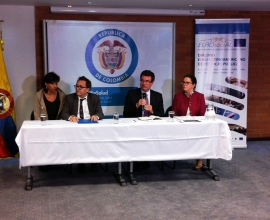The national programme for rational use of medicines in Colombia: a success story in the “new cooperation”
To support the design and implementation of its national programme for rational use of medicines, the Ministry of Health and Social Protection led a successful strategy of cooperation between international donors and national and local stakeholders
The strategy, presented at a workshop at the Ministry of Health, is a wise move that is becoming a paradigmatic example of the agenda of aid efficiency, and it is providing its first fruits.
With the approval of the pharmaceutical policy (CONPES 155/2012), the Ministry of Health is laying down the groundwork for an ambitious reform to improve access to medicines by Colombians. One of the objectives of this policy is to improve rational use of medicines to avoid improper use (and its negative consequences for health), as well as the rationalise public and private spending on health. In both cases, the persons most affected are also the most vulnerable, either due to lack of information, difficulties with access, and/or excessive costs (which can cause people to fall into poverty). Due to these factors, among others, irrational use of medicines worsens inequality.
Making a commitment to rational use of medicines is, therefore, a commitment to equity. Based on these premises, in 2013 the EUROsociAL cooperation programme of the European Union started supporting the rational use policy, contributing its efforts and integrating itself into an ambitious strategy of collaborative cooperation led by the Ministry of Health. The policy was presented in Bogotá on 26th, 27th and 28th January.
The workshop, inaugurated by the Deputy Minister of Social Protection, Carmen Eugenia Dávila, had the objective of reflecting on the progress made and the perspectives of the collaborative strategy, and of presenting the first results of the pilot project.
The first session was an opportunity to highlight the main characteristics of the collaborative strategy, which horizontally links the national and local stakeholders involved in the medicine policy (Secretariat of Transparency, National Institute for Medicine and Food Surveillance, Institute for Evaluation of Technologies in Health, Departmental Health Secretariats, professional associations). In addition, it links international cooperation stakeholders: EUROsociAL, the Anti-Corruption and Transparency programme of the European Union (ACTUE), the IDB, the French Development Agency, OPS. In this way, the Ministry ensures the alignment of donors with its policy, objectives and time frames; and it takes advantage of the added value of each of them. The strategy ensures effective coordination and complementarity in the actions of donors, under the leadership of the Ministry, avoiding some of the most frequent traps of cooperation: duplication, overlapping administrative structures, actions not oriented towards results, etc. It is, in the words of the IDB representative, “a paradigm shift and an extraordinary example of collaboration”. A clear instance of putting international commitments in the area of aid efficiency into practice.
The following sessions were focused on presentation of the first results of the pilot project, which was launched in August 2014 in six hospitals in the department of Cundinamarca and which promotes rational use of drugs to treat high blood pressure. The pilot project acts on the production of independent information to encourage the prescription of drugs that, given equal indications and effectiveness, are lower in cost and also included in the Compulsory Health Plan (package of services covered by the social security system). This results in substantial savings, not only for the public health system but also for patients. It is hoped that prescriptions for medicines can be made more accessible in 80% of cases.
Mobilising the experiences of the Madrid and Navarre Spanish Autonomous Communities, France, Sweden and Argentina, EUROsociAL supported the pilot project with the preparation of three deliverables: an independent information bulletin (collaboration with the IDB), an information system to support prescribing (collaboration with the Secretariat of Health of Cundinamarca) and the national pharmacopoeia (collaboration with the ACTUE programme). With just five months in operation, the first results are encouraging. At the hospital of Soacha, in which the majority of patients are vulnerable (strata 1-4), prescription of the most costly drugs has decreased notably.
At the closing of the workshop, Health Minister Alejandro Gaviria confirmed that a draft has already been prepared of the resolution that seeks to regulate rational use of medicines and transparency in pharmaceutical industry relations with healthcare professionals. The Minister stated that the measure seeks to “change behaviours and avoid some of these irrational uses of medications”.
The expert from the French food and drug agency who participated in the workshop explained that in France, this type of measure has made it possible to regulate the information from approximately 2,000 companies in the drug, medical device and cosmetics sector. In Colombia, this represents a first step towards “reconquering spaces”, one of the main challenges according to the Ministry's advisory team.
In coming months, EUROsociAL will continue to support this reform with the updating of the regulatory framework and scaling up the pilot project to make it a national programme.
The resolution project is available on the Ministry's website, as part of an open and participatory process, to receive observations and remarks until 15th February 2015.
In the photo: Jean-Baptiste Brunet (French National Agency for Medicines and Health Products Safety), Alejandro Gaviria (Colombian Minister of Health) and Carolina Gómez (Director of Medicines, Colombian Ministry of Health)
FIIAPP

